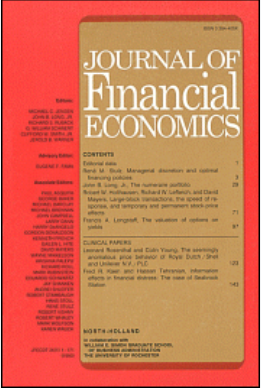The moral preferences of investors: Experimental evidence
IF 10.4
1区 经济学
Q1 BUSINESS, FINANCE
引用次数: 0
Abstract
We characterize investors’ moral preferences in a parsimonious experimental setting, where we auction stocks with various ethical features. We find strong evidence that investors seek to align their investments with their social values (“value alignment”), and find no evidence of behavior driven by the social impact of investment decisions (“impact-seeking preferences”). First, the willingness to pay (WTP) for a stock is an increasing and quasi-linear function of corporate externalities. Second, this WTP does not change when corporate externalities are made contingent on investors buying the auctioned stock. Our results are thus compatible with a utility-maximization model where non-pecuniary benefits of firms’ externalities only accrue through stock ownership, not through the actual impact of investment decisions. Finally, the ability to directly contribute to the externality (by donating) does not reduce the willingness to pay for virtuous stocks.
投资者的道德偏好:实验证据
我们通过拍卖具有各种道德特征的股票来描述投资者的道德偏好。我们发现,有强有力的证据表明投资者寻求使他们的投资与其社会价值观相一致("价值一致性"),但没有证据表明投资者的行为是受投资决策的社会影响驱动的("寻求影响的偏好")。首先,股票的支付意愿(WTP)是企业外部性的递增准线性函数。其次,当企业外部性以投资者购买拍卖股票为条件时,这种支付意愿不会改变。因此,我们的结果符合效用最大化模型,在该模型中,企业外部性的非金钱利益只通过股票所有权而非投资决策的实际影响产生。最后,直接为外部性做出贡献的能力(通过捐赠)并不会降低对良性股票的支付意愿。
本文章由计算机程序翻译,如有差异,请以英文原文为准。
求助全文
约1分钟内获得全文
求助全文
来源期刊

Journal of Financial Economics
Multiple-
CiteScore
15.80
自引率
4.50%
发文量
192
审稿时长
37 days
期刊介绍:
The Journal of Financial Economics provides a specialized forum for the publication of research in the area of financial economics and the theory of the firm, placing primary emphasis on the highest quality analytical, empirical, and clinical contributions in the following major areas: capital markets, financial institutions, corporate finance, corporate governance, and the economics of organizations.
 求助内容:
求助内容: 应助结果提醒方式:
应助结果提醒方式:


